#La Colonisation
Text
La Colonisation: French History of Death, Torture and Indescribable Violence in the Pearl of Its Evil Empire! Many Issues Arising From France’s Colonial Crimes in Algeria Have Still Not Been Resolved
— April 10, 2024 | RT
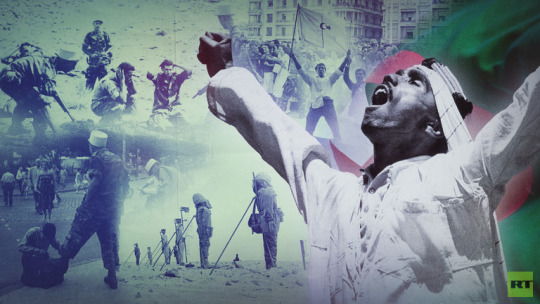
© RT/RT
Every year, Algeria remembers the colonial crimes committed by France against the Algerian people. The North African country commemorates several such dates throughout the year: February 13 – the day of the first nuclear test, July 5 – Independence Day, November 1 – Revolution Day, which marked the beginning of the eight-year independence war of 1954-1962, and December 11 – the day on which mass demonstrations started in 1960, and were brutally suppressed by French troops.
Algeria’s colonial period lasted for over 130 years, but the nation didn’t give up on its dream of breaking free from colonial oppression. Algeria’s sovereignty was finally recognized in 1962. But independence was won with a great deal of blood. According to official Algerian data, about 1.5 million local residents died in the war with France (1954-1962), about one sixth of the country’s population at the time.
Addressing the people on the occasion of Independence Day in 2021, Algerian President Abdelmadjid Tebboune recalled that the French colonialists were responsible for the most cruel violence, murder, and destruction in Algeria. Historians estimate that from 1830 to 1962 the colonialists caused the deaths of over five million people, including those who died as a result of contamination from nuclear tests.
In the 1954-1962 war against the National Liberation Front (Le Front de libération nationale, FLN), the French used civilians as hostages and human shields. Historians have documented numerous cases when French colonialists exterminated entire villages. They resorted to electric shock torture, used wells as prisons, threw prisoners from helicopters, and buried people alive in mass graves which the victims were forced to dig for themselves. The European invaders used the most sophisticated and cruel methods of torture.
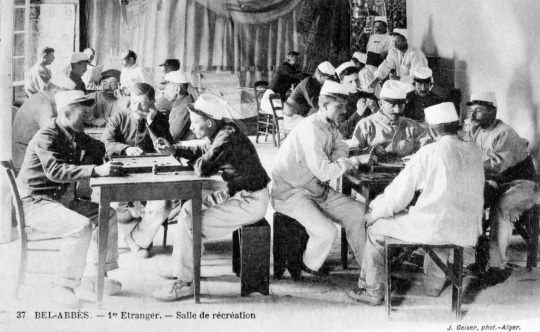
French Foreign Legion, Sidi Bel Abbes, Algeria, 20th century. French postcard. © Art Media/Print Collector/Getty Images
The Musée de l’Homme in Paris still houses 18,000 skulls acquired from dependent territories, of which only 500 have been identified, according to French media. Most of these skulls are not publicly exhibited. The skulls of several dozen Algerian resistance fighters have also been kept in the museum since the 19th century.
France’s colonial crimes affected not only people, but also Algeria’s cultural and historical heritage. During the occupation period from 1830 to 1962, the French transported hundreds of thousands of documents to Paris, including those related to the Ottoman period (1518-1830). Since gaining independence, Algeria has appealed to France to return the archive. But each time when this issue comes up, France says that according to its laws, the documents are considered classified and their disclosure is a threat to national security.
French Ontervention
The French invasion of Algeria in 1830 marked the beginning of the European country’s extensive colonization of Asian and African territories. The occupation process stretched on for several decades, as the local population put up an active resistance.
At the beginning of the 19th century, Algeria remained under the nominal rule of the Ottoman Empire, to which it regularly made tribute payments. However, the country retained much of its independence when it came to external political and commercial contacts. During France’s Italian and Egyptian campaigns (1793-1798) Algeria supplied Paris with wheat on credit. In the following decades, however, France refused to pay the debt, which resulted in major disagreements between the two countries.
In 1827, during one such dispute, Algeria’s Ottoman governor, Hussein Pasha, lost his temper and slapped the French ambassador Pierre Deval with a fly swatter (or a fan, according to other accounts). The King of France, Charles X, used this incident as an excuse to invade Algeria, believing that given the internal instability France was going through, an external military campaign could help rally society around the throne.
In the summer of 1830, a 37,000-strong expeditionary force from Paris arrived near Algiers and soon entered the city. Hussein Pasha capitulated. This victory did not help Charles X, who eventually abdicated, but the French remained in Algeria for the next 132 years.
Abd al-Qadir
Having occupied several Mediterranean ports, the Europeans decided to move inland, but at that point the local Arabs and Berbers, who had previously fought against the Ottoman Empire, put up strong resistance.
The anti-French movement was led by Abd al-Qadir, the son of the leader of the Qadiriyya, a local Sufi order. In November 1832, he was proclaimed as the emir of the Arab tribes in the west of the country, and united the local population in the fight against the French occupation. Abd al-Qadir was adept at managing territories and conducting guerrilla warfare, and fought against the invaders for 15 years. He became a legendary figure, and his fame spread throughout the Muslim world and Europe.
Abd al-Qadir was very popular among Algerians, since he was considered a descendant of the Prophet Muhammad (i.e. a Sharif) and a true ruler of the faithful. However, resorting to pogroms and the mass extermination of the local population, the French deprived him of the support of many military leaders and turned the course of the war in their favor.
The Algerians paid a heavy price for the resistance – hundreds of thousands died as a result of it. From 1847 to 1852, Abd al-Qadir remained in a French prison, after which he was released and went to live in exile in Damascus, where he died in 1883.
Algérie Française: No Rights For Locals
In the following decades, Algeria was actively colonized, and the colonial territory expanded south. By 1847, there were about 110,000 European settlers in Algeria, and by 1870 this number had doubled.
In 1848, Algeria was declared a territory of France and was designated as its overseas department, with a European Governor-General in charge. The locals became subjects (but not citizens) of France. After the Ottomans were ousted from Algeria and the Abd al-Qadir movement was suppressed, the French had to deal with several other major uprisings in the 19th century, the last of which occurred in 1871-1872.
By the beginning of the 20th century, the French had conquered lands stretching from the Mediterranean Sea to the Sahara. In the 1920s, over 800,000 French settlers resided in Algeria. Three provinces – Oran, Algiers, and Constantine – became French departments. They elected representatives to the French Chamber of Deputies, but only European settlers who backed the interests of Paris could take part in these elections. Algerians did not have the right to vote.
Economic Benefits
Economically speaking, the period between 1885-1930 is considered the golden age of French Algeria (and of the entire French Maghreb region). The country’s most important ports and cities were rebuilt and modernized and the agricultural sector was actively developed. Muslims had relative autonomy and retained their religious and cultural institutions.
The demographic boom, facilitated by European achievements in the fields of health and medicine, led to a threefold increase in the population, which reached nine million by the mid-20th century. Out of these, about a million were French colonists who seized about 40% of the cultivated land, which meant the most fertile land in the country belonged to them.
In other areas of life, there was also inequality between the locals and the colonizers. Local workers were paid less, and about 75% of Algerians remained illiterate. Despite these issues, however, peace lasted in the country for many decades.
Paris derived great economic benefits from its new territories. Algeria occupied a central place among France’s eastern possessions and its location was strategically important since the most convenient routes which connected France with its colonies in West and Central Africa passed through Algeria.
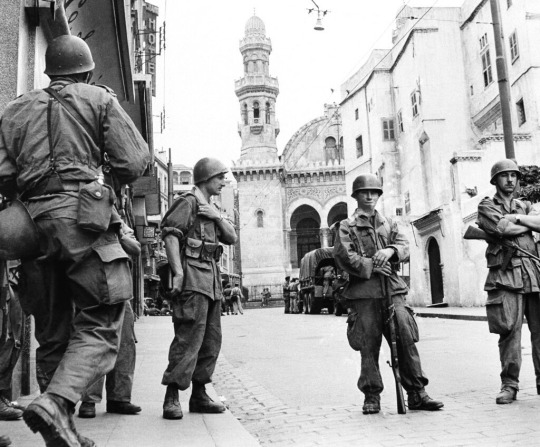
In May 27, 1956 file photo, French troops seal off Algiers' notorious casbah, 400-year-old teeming Arab quarter. © AP Photo, File
The largest and bloodiest massacre committed by France in a single day occurred on May 8, 1945, when hundreds of thousands of Algerians took to the streets to celebrate the end of World War II. When people started shouting slogans demanding independence, the colonial forces opened fire on the peaceful protesters. At least 45,000 unarmed demonstrators were killed that day.
Protests broke out in France as well, and were also brutally suppressed. October 17, 1961, went down in history as the day of the “Massacre on the Seine”, or the “Paris pogrom”. On that day, about 60,000 Algerians took to the streets of Paris, demanding an end to the colonization of their country. The French authorities again used firearms against peaceful protesters, many of whom were thrown into the River Seine. The death toll amounted to 1,500, while 800 people went missing, and thousands were detained.
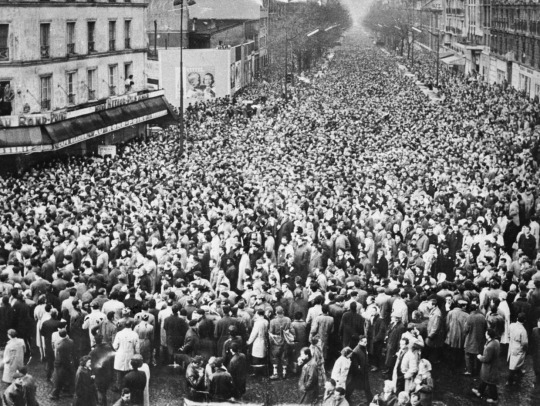
The working people of Paris demanding an end to the war in Algeria. 1962. Reproduction of a photo from the newspaper L'Humanite. © RIA Novosti / Sputnik
However, this did not stop the national liberation movement in Algeria. In November 1954, an alliance of several political organizations formed the National Liberation Front (le Front de Libération Nationale), which headed the armed struggle for independence. Many underground guerrilla groups also sprang up that supported the sovereignty of Algeria. At the end of 1954, they all went into attack, and this marked the beginning of the Algerian War of Independence, which lasted until March 1962.
Paris sent additional military units to Algeria to fight the rebels. An estimated 500,000 to 1.5 million local residents and over 15,000 European servicemen died as a result of the hostilities, which lasted more than seven years.
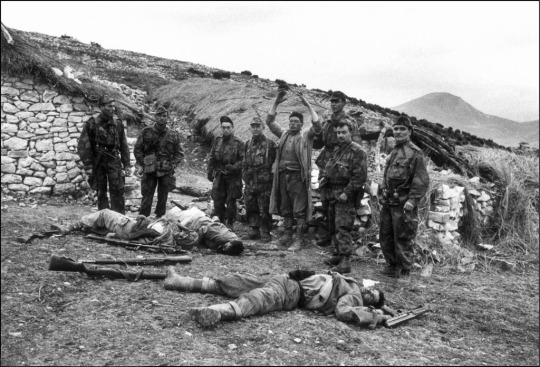
French soldiers looking at dead bodies during "Operation Bigeard" in March 1956, when an armed outbreak in Souk-Ahras, South of Constantine region, Algeria. © Reporters Associes/Gamma-Rapho via Getty Images
France won the war on a tactical level, but suffered a political and reputational defeat – its actions drew sharp criticism from its own citizens and the world community.
After negotiations and the signing of the Évian Accords, Algerians held a referendum and almost unanimously voted for independence, which was officially proclaimed on July 5, 1962.
Demining
After the war, it was necessary to clear the territory of mines. Since Algeria did not have qualified sappers, it requested assistance from European countries (Italy, Sweden, and Germany), but they refused to help. Private companies could not solve the problem either.
It was then that the USSR agreed to help Algeria, free of charge. On July 27, 1963, an agreement was signed between the Soviet leadership and Algeria. Soviet specialists removed about 1.5 million mines in Algeria from 1962 to 1965.
Nuclear Tests
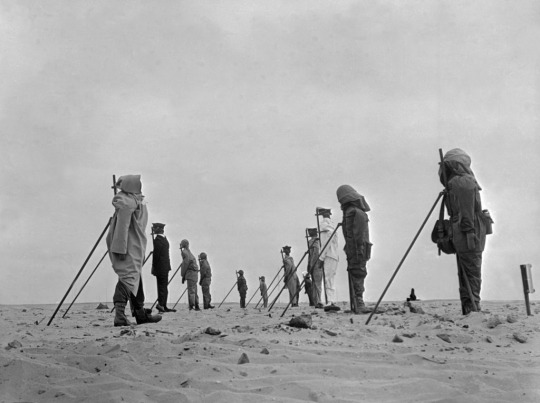
A group of dummies set up on the French nuclear weapons testing range near Reggane, Algeria, before Frances third atomic bomb test, 27th December 1960. © Keystone-France/Gamma-Keystone via Getty Images
One of the greatest crimes against humanity was the testing of nuclear and chemical weapons of mass destruction, which was carried out by France from 1960 to 1966 in the Sahara Desert in Algeria.
The first nuclear explosion happened on February 13, 1960, near the town of Zaouit Reggani in southwestern Algeria and was codenamed “Gerboise Bleue”. This experiment launched the process that turned Algeria into France’s nuclear test site. The power of the nuclear bomb was estimated at 60-70 kilotons, which is about four times greater than the bomb dropped by the US on Hiroshima during WWII.
A total of 17 nuclear tests were conducted in Algeria, which led to the death of 42,000 Algerians. Many people became disabled, and the negative impact on the environment and the health of local residents is felt to this day. Algerian authorities are demanding that France hand over maps which show where the radioactive waste from these experiments was disposed of. But to this day, France hasn’t complied.
France Is Still There
France suffered a severe blow when it lost its largest African colony, from which it derived great economic benefit. To this day, many problems between the two countries have not been fully resolved, and echoes of imperialism are still evident in their relations.
Algeria wants France to officially admit its guilt, and take responsibility for the past events. However, in the past 60 years, Paris has never offered an official apology to Algeria, although some of its leaders made certain apologetic statements. Moreover, Algerian leaders often raise the issue of approving a bill which would criminalize the colonial policy of Paris.
After gaining independence, Algeria faced contradictory emotions – it wanted to put an end to its former dependence on France, but the well-established trade ties, the lack of experienced national government officials, and the military presence stipulated by the Evian Accords ensured the presence of France in Algeria. Moreover, Paris provided the necessary financial assistance and supplied Algeria with essential goods.
Things changed when Algerian authorities decided to nationalize industrial and energy enterprises in the late 1960s. France’s intervention in the Western Sahara conflict, in which it supported Morocco, and a stop in purchases of Algerian oil, which led to a trade imbalance in the late 1970s, further strained relations between the two countries. However, despite a decline in political relations, economic ties with France– especially those related to the energy sector – have remained strong throughout the history of independent Algeria.
Four Key Issues
In December 2018, Algerian Minister of War Veterans Tayeb Zitouni stated that there are four key issues (the so-called “memory file”) related to the era of imperialism: the archive of documents from the colonial and Ottoman periods, the skulls of resistance fighters which are stored in the Paris Museum, the file of people who went missing during the war of independence, and compensation for the victims of nuclear tests. Zitouni said that addressing these issues is key to ensuring normal relations between France and Algeria.
In 2020, French President Emmanuel Macron agreed to hand over the remains of 24 Algerian resistance leaders who were killed and then beheaded by French colonial troops prior to the November 1954 revolution. All of them were buried at El Alia cemetery in Algiers. Negotiations continue on the return of other skulls, the number of which is not specified.
In late 2021, new tensions sprang up between France and Algeria. In his days as a presidential candidate, Emmanuel Macron recognized the colonization of Algeria as a crime against humanity. Macron said this on February 16, 2017, during a trip to Algeria. Nevertheless, by the end of his first presidential term, the countries were on the verge of a new diplomatic crisis – Macron still had not made an official apology for the “mistakes” of the past.
On October 3, 2021, Algeria decided to “immediately recall” its ambassador to France. The reaction was a response to an interview by Macron, published in Le Monde, in which he stated that since gaining independence in 1962, Algeria has lived off “income from history” which is diligently guarded by the military and political authorities, and questioned the existence of the Algerian nation prior to French colonialism. The former colony was insulted by these words.
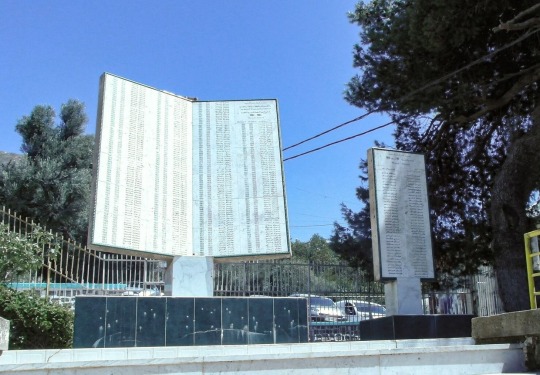
Monument in Kherrata. © Wikipedia
Soon, Algerian authorities took even stricter measures. The next day, Algeria banned French military planes from its airspace. This order is still in force. In 2023, the authorities declined France’s request to open Algerian airspace for French military aircraft heading to Niger, where a military coup had taken place – an event that seriously undermined France’s influence in the region.
In an attempt to improve relations with Algeria, Macron paid a visit to the country in August 2022 and signed a new partnership agreement with President Abdelmajid Tebboune, on cooperation in various fields. However, relations between the countries remain tense. Tebboune was supposed to respond with a similar visit on May 3, 2023, but it has been postponed. The reasons are the same – Algeria is still waiting for France to take action on a number of issues, which are all related to historical memory.
— By Tamara Ryzhenkova, Orientalist, Senior Lecturer at the Department of History of the Middle East, St. Petersburg State University, Expert for the Telegram Channel ‘Arab Africa’
#Feature#La Colonisation#France 🇫🇷#French History | Torture | Death | Indescribable Violence#The Evil Empire#France 🇫🇷 Colonial Crimes#Unresolved Crimes | Algeria 🇩🇿#RT#By Tamara Ryzhenkova | Orientalist | Senior Lecturer#Department of History | Middle East#St. Petersburg State University#Arab Africa#Continent of Africa | France 🇫🇷 | Nuclear ☢️ Weapons
1 note
·
View note
Text
instagram






#free kanaky#kanaky nouvelle caledonie#kanaky new caledonia#kanaky#vive la kanaky libre#barbarie et civilisation toujours le même discours#qui est du mauvais côté de l'histoire ?#colonization#colonialism#colonisation#colonisation française#french settlers#nouvelle calédonie#new caledonia#Instagram
2 notes
·
View notes
Text
Proposition ultime.
Même les plus malhonnêtes commencent à se gêner à ne pas reconnaître que Kinshasa échoue. Quoi proposer dans une telle situation, où, de toute évidence, le Congo a atteint ses limites cognitives, spirituelles, physiques ? Nous y avons réfléchi et propos… Ultimement, si nous pouvons nous permettre de le penser ou de la dire plutôt.
Nous voudrions proposer aux congolais la création d’une société…
View On WordPress
#allochtones#autochtones#étrangers#Colonisation#EAE ASBL#La Congolaise SA#nationaux#Société#spiritualité
0 notes
Text
Napoletani want to be oppressed so bad it's a kink ...che poi se la cantano e se la suonano nessuno ha detto mai niente
#pensa se uno del nord dicesse le robe che dicono loro minchia se lo mangerebbero vivo#oh my God but ur so funny ur joking yall are victim of racism on daily basis pls tell me to kms and that i deserve death#tipo la gente delle mInOriTies che ce l ha coi bianchi colonisers su tumblr ma versione bel paese#watch il tizio neomelodico vincere sanremo ma nella tag mi devo leggere gli insulti nel cazzo di 2024 boh
1 note
·
View note
Text
Imago
Imago, Nathalie Le Gendre
PrésentationDepuis un mystérieux cataclysme, le peuple K’awil vit retiré du monde, au coeur d’une montagne tout en labyrinthes et en jeux de lumière, protégé des regards par une jungle luxuriante. Dans cette société composée de sept clans aux prérogatives bien définies, ce sont les femmes qui règnent en maîtres.Parce que sa soeur vient de mourir, tuée par un K’tioni,…

View On WordPress
#16/20#Amour#Aventure#Colonisation#Drame#Fantastique#Harmonie#Imago#Initiation#Jeunesse#Liquidation de la liste d&039;envies qui date de 10 ans#Liste de Bronze#Monde post-apocalyptique#Mort#Nathalie Le Gendre#Nature
0 notes
Text
RAPPEL !!
Voici les sponsors officiels du génocide et de la colonisation de la Palestine
#boycott israeli products#boycott israel#israel is an apartheid state#israel is committing genocide#israel is a terrorist state#israel is an illegal occupier#israel is a war criminal#israel is evil#israel crimes#israel commits genocide#palestine#stand with palestine#free palestine#free gaza#gaza#palestinian lives matter#stand with gaza#gaza genocide#i stand with palestine#genocide in gaza#gaza fights for freedom#palestine will never die#palestine will be free#from the river to the sea palestine will be free
53 notes
·
View notes
Text
I started Reckoning of Roku against better judgement and I have to say: does ATLA want me to suspend my disbelief a la monarchy or not?
Like, Zuko being crowned Fire Lord was considered to be a good ending—whereas through real world logic, toppling the monarchy would've actually been more egalitarian.
So I've always suspended my disbelief with regards to that—and now Gyatso actually confronts Roku about it. He also says there have never been female Fire Lords and how the word Fire Lord is inherently masculine (so Izumi becoming Fire Lord is actually very real world equivalent of, say, a woman becoming chairman/woman).
But I'm just really hung up about the monarchy aspect of it: because if we were to apply real world logic to it a traumatised 16 yo being crowned a monarch of a post-war nation that should (again, realistically speaking) take years to stabilize is tragic, not happy.
But if I do apply real world logic to ATLA world as Reckoning of Roku wants me to?—then I'd say I LOVE GYATSO!!! HE'S A RIOT!!!YOU CAN CLEARLY SEE WHERE AANG GOT HIS SASS FROM!!!
And everything Gyatso says about class difference and autocratic governments is so correct and valid of him.
He served cunt.
Also, the Air Nomads being accepting of gender fluidity? Amazing.
While I still think gender segregation of the temples wasn't a good thing let's get this straight: victims don't have to be perfect. We can consider it a flaw of Air Nomad society, that is no justification for Sozin going genocidal on them!!! And you know that's not the reason he did for duh 😒 (as if anyone colonises anyone because tHey'Re bAckWArd) It's very similar to how South Asia has a gender segregation culture, but we have very rich trans history. Which, again, in no way means we're free of transphobia. (Although Air Nomads do not feel transphobic from the text) It's nuanced.
As for Fire Nation culture being so militaristic at this point. It makes sense. (I wish I had read Kyoshi novels first so I'd know what Fire Nation was like during her and Rangi's time, especially because ATLA tried to hammer in how Fire Nation has lost a lot of its real essence to imperialism too).
My reading of this is: Sozin didn't just wake up one day and decided to colonise the world. It must have happened gradually, especially the cultural shift. Roku lived on the precipice of the war. He was the reason it didn't break out even earlier. So it makes sense that we see these tendencies in the Fire Nation already: political atmosphere was already shifting. Gyatso sees it too and he doesn't like it. Remember how the Air Nomad council was debating whether to tell Aang he's the Avatar?
Because they anticipated a war was coming.
Another complain I have is Gyatso using language that, say, in a few years Fire Nation is going to use for Air Nomads after they genocided them. Words like ‘backward’ and all. Because everything Gyatso means to say is RIGHT—making him use that language was a wrong writing choice.
#honestly i started reading BECAUSE GYATSO#i wanted to know the man that raised aang 😌#reckoning of roku#i have a feeling im gonna read yangchen novels even before the kyoshi ones because i wanna know more about air nomad culture
55 notes
·
View notes
Photo

Leo Africanus
Leo Africanus (al-Hasan ibn Muhammad ibn Ahmad al-Wazzan al-Fasi al-Granati, 1485-1554) was a diplomat, merchant traveller and scholar who famously voyaged from Timbuktu to the Niger River and wrote 'The History and Description of Africa' (La Descrittione dell'Africa, 1526). Captured by Mediterranean pirates, he so impressed them with his learning and linguistic ability, that they gifted him as a slave to Pope Leo X (1498 -1526).
Leo Africanus was born into a family of clerics and accountants to the court of the Nasrid Dynasty (1238-1492) of Granada during the last days of their rule over the Emirate of Granada. Hasan was baptised Johannes Leo Africanus, and known in Italian as Giovanni Leone. He trained as an Islamic scholar and became a diplomat, travelling across West Africa, from Cairo and Aswan across to the Hejaz and Syria. It was during his return journey from Egypt that he was kidnapped by Mediterranean Christian pirates and ended up becoming a slave to the Vatican Pope Leo X (born Giovanni de’ Medici). Pope Leo X offered Hasan his freedom on condition that he converted to Christianity.
Leo Africanus' scholarship and translations from Arabic inspired early modern ideas of Africa and the Islamic world. His work Descrittione dell'Africa became a blueprint for European explorers seeking to monopolise trade and resources from the African subcontinent. Some historians believe that William Shakespeare’s (1564-1616) Othello is based on Leo Africanus. Descrittione dell'Africa was widely read in Europe. It became an important resource and guidebook on Africa, until the European colonisation during the 19th century.
Hasan al-Wazzan
Hasan al-Wazzan’s father, Ahmad al-Wazzan was a cleric in the court of Abu Abdallah Muhammad XII (c. 1460–1533), known in Europe as Boabdil. Hasan’s forbearers worked as aids to the court muhtasib of Granada – a magistrate who oversaw merchant trade and accounts, while also upholding morality and decorum in the public sphere. Hasan grew up alongside his father and grandfather under the influence of the Nasrid court. As a child, he spoke Arabic at home and Spanish in the streets.
Leo Africanus as Shakespeare's Othello
Théodore Chassériau (Public Domain)
In 1492, after a decade long war, Boabdil surrendered Granada to the Spanish Catholic monarchs Isabella I of Castile (1451-1504) and Ferdinand II, King of Aragon (1452 –1516), marking the end of 700 years of Muslim rule. Hasan’s family may have left Granada before 1492, or they could have stayed until the Reconquista. Hasan was a young child when his family, like many Andalusian migrants, fled persecution under the new Christian monarchs, crossing the Mediterranean to settle in Fez. Luckily Hasan’s family was well connected thanks to his uncle, already settled in Fez, who was a diplomat to the Wattasid rulers, serving Sultan Muhammad al-Shaykh (1490-1557). Consequently, they secured a home in a prominent quarter of Fez. His father purchased land north of the Rif Mountains and rented a castle above Fez. Other emigrant families from Granada however struggled greatly in Fez and complained publicly.
Continue reading...
28 notes
·
View notes
Photo
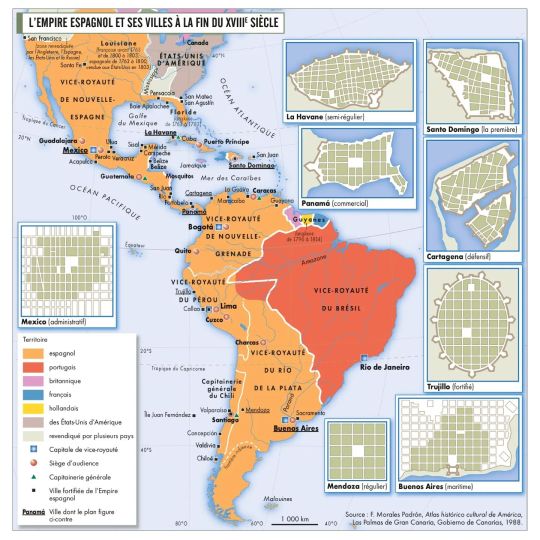
Spanish America
"Atlas des premières colonisations", Autrement, 2013
by cartesdhistoire
75 notes
·
View notes
Text

De Gaulle ne participait pas au raout du débarquement en Normandie, pour lui les américains n’avaient pas libéré la France, ils étaient venus la coloniser.
Quel parti s’oppose aujourd’hui aux guerres de l’OTAN ?
US GO HOME ! lisait-on sur tous les murs entre 1945 et 1968…
33 notes
·
View notes
Text
Just remembered something about NCIS that is very disturbing.
One of the main characters is an Israeli who often talks very fondly of Israel, which isn’t bad on its own, but factor in that she’s a Mossad agent whose father explicitly hates Palestinians…yeah. Ziva is almost certainly a Zionist and probably at least helped commit some crimes against humanity.
But that’s not what I’m talking about as being very disturbing. No, that would be Ziva’s half brother, Ari Haswari. Their father, Eli David, the head of Mossad, deliberately conceived Ari with a Palestinian woman so he could be a mole within Hamas. It seems very unlikely to me that a Palestinian woman would consent to having sex with the head of Mossad, so…yeah, nonchalant implication of the rape of a Palestinian woman. Fantastic start.
Oh, it gets worse. See, one of Eli David’s children is a good person who just wants to help people with NCIS and the other is an evil nasty terrorist who just wants to hurt people. Guess which one the half Palestinian Hamas mole is.
…yep. It’s what you’re thinking. They wrote that the Mossad agent is the good nice one and the half Palestinian one is the evil terrorist one.
Now, this plotline is from 2004/2005, and I don’t know what the general knowledge level of the Israeli colonisation and oppression of Palestinians was then, but the Ziva extols the virtues of Israel and is a good nice Mossad agent storyline continued until 2013. And they’ve just announced a spin off featuring her and Tony, because making a show where the main character is a proud Israeli Mossad agent is such a great idea right now.
Of course, we’re talking about NCIS here. This show and its spin off NCIS LA love a good Muslim terrorist cell plot. Ugh.
#NCIS#i used to love this show#but there’s so much praise for Israel in it#I don’t think I’d be able to watch it again#fuck israel#free palestine#ziva david#ari haswari#eli david
41 notes
·
View notes
Text
[Machine Translation]
The FLNC castigates autonomy and continues its fight against “settler colonization”
During a clandestine press conference, the National Liberation Front of Corsica - which brings together the groups "Union of Combatants" and "October 22" - addressed several themes through the reading of a press release, signed with the slogans of the two entities.
On the first of the three pages, the FLNC denounces “ so-called settlement colonization” . “ It is the most pernicious and always a strategic choice of the colonizer,” it is written. “The position of Corsica under French supervision is a formidable hypocrisy.”
For the shrouded figures, " the current political situation of Corsica in the bosom of France leads to the same results as all the settlements in the world".
The FLNC describes the figures as " edifying" concerning the demographic evolution of the island: " between 2015 and 2021, Corsica will experience an increase in the population of 20,310 residents. For the most part French", say the shrouded figures.[...]
The text also alludes to Emmanuel Macron's speech last September to the Corsican Assembly. The Head of State had announced his desire to include Corsica in the Constitution, opening the way " to autonomy in the Republic" . He did not then mention the notion of the Corsican people, evoking " an insular, linguistic, historical and cultural community" .[...]
In its press release, the FLNC also placed a large part of its argument in the international context, particularly in relation to the situation in Gaza.
“We support the Palestinian cause. Since our creation and still today,” affirms the clandestine organization which thus recalls some of its fundamentals. Ditto when she insists three times that she has “ no common destiny with France” . Or when she denounces the “ colonizer complex” .[...]
On the third and last page, the clandestine group “recalls the 45 actions of last October” . The organization is probably referring to the blue night of October 8 to 9 when simultaneous attacks were carried out on the island , mainly targeting second homes.
This series - on a scale not seen since December 2012 - was claimed by the FLNC the next day. However, the underground movement had until now not given the total number of these actions, only listed by sector in the press release.
26 Jan 24
51 notes
·
View notes
Text
*Zuko wins Katara's love*
"Wow. So poetic. They were truly meant to be. It was literally built into the DNA of the show since day 1. They were foreshadowed minute by minute, scene by scene, plot point by meticulously crafted plot point. This is right up there with Pride And Prejudice and the Song Of Songs. It shows the power of redemption and forgiveness. It showcases Katara's agency and strength and independence, as her feelings were always obvious and well fleshed-out. She really deserves Zuko, he's so mature and wise, unlike Bald Buddhist Hitler, ERR, I MEAN...poor little Aang. Zuko is the only one who really understands Katara because f*** Sokka, and always pushes her to be the best version of herself. He has been through similar pain and anguish, and always empathises with her. Sweet Ray Of Sunshine and Dark Angsty Hottie, Yin and Yang, Tui and La, Push and Pull, Pythagorean and Meantone, Tories and Whigs, IT'S SO ORIGINAL! It's so deep that it beggars belief! And just think of the possibilities, Momtara, Zutara babies, Fire Lord Zuko and Fire Lady Diplomat Katara, OHMYGOSH I CAN'T EVEN!!!!"
*Aang wins Katara's love*
"WHAT THE F***??? THIS CAME OUT OF NOWHERE! THERE WAS NO INDICATION! THE HINTS WERE FORCED AND AMBIGUOUS! BRYKE FORCED THIS ONTO THE WRITERS! MAIN GIRL × MAIN GUY AGAIN, IT'S BORING AND OVERDONE! AANG IS AN IMMATURE MANCHILD WHO NEVER THINKS ABOUT HIS ACTIONS AND HE DOESN'T DESERVE HER! HE ORDERS HER AROUND LIKE A HANDMAIDEN! HE SAW HER THROUGH ROSE-TINTED GLASSES AND ONLY EVER FELL IN LOVE WITH HER IDEALISED VERSION! HE NEVER ACKNOWLEDGED HER AS A HUMAN BEING, HE COULD NEVER KNOW THE PAIN THAT SHE WENT THROUGH! KATAANG IS A SHALLOW PAIRING WHICH WAS NEVER FLESHED OUT, IT WAS ALWAYS ABOUT HIM! KATARA IS A TROPHY WIFE! HE'S AN ENTITLED COLONISER INCEL! HE SEXUALLY ABUSED KATARA AND WILL PROBABLY FORCE HER TO GIVE UP HER CULTURE AND BECOME A STAY-AT-HOME-WIFE! WHY AREN'T YOU ANGRY YET????"
#Sixteen years. SIXTEEN YEARS and not a single thing has changed.#anti zutara#kataang#aang defence squad#aang deserves better
54 notes
·
View notes
Text
babel, and why i love it (SPOILERS!!!!)
ok im terribly late to reading it, for its not sold in many places where i live, so i found the pdf luckily.
babel is a book about colonialism and racism and oppression, it is about revolution and battling your inner conscience (in my opinion at least, i'll elaborate later). it tells the story of robin swift coming to the prestigious royal institute of translation or better known as babel, where during his yrs there he discovers that the glamourous oxford university isnt such a righteous place. his loyalty is tested, blood is shed and tears fall which leads up to a revolution to stop an incoming war.
there are many reviews regarding how its racist to white ppl (which is astounding to even think about) and that its not accurate as women werent allowed to go to university in the 1830s but im not going to talk about that, that much. i wanted to speak on the actual translation/language aspect of it.
throughout the book, translation and language r some of the main themes (obviously) but the impact it has on the people, both in the book and irl is smth i havent seen anyone mention. language isnt just a form of communication but it is part of our culture, it is part of our identity, and during colonial times many languages suffered, they were being erased as they were "barbaric" or "strange" they were banned and anyone who spoke them was punished like in victoires chapter. robin, ramy and victoire all can barely speak their native languages, robin has almost fogotten cantonese, ramy has very basic knowledge of bengali and victoire is never given a chance or is permitted to speak in haitian creole. they lost one of the main things that connects them to their motherland, they only have their appearance left. they will never be able to talk to their ppl properly.
victoire was frustrated that haitian creole isnt recognised as a proper language like how in their exams, her match-pair wouldnt be counted properly as haitian creole wouldnt be used much hence its "useless" in the eyes of prof. leblanc. she was beaten when she would speak haitian croele in her house in france. when she first came to babel she was correcting herself from "kreyol" to "haitian creole" and was unsure if she could even study it.
robin realised that prof.lovell actually knew more than him about his own language, his mother tongue. he could barely stand being back in canton and he felt isolated in a way as everything changed and was new and so was the language even though he was born hearing and speaking it.
not much is talked about this with ramy except that he barely knows bengali, even though hes fluent in english, latin, greek, arabic, persian and urdu. he knows 6 languages and in his chapter he is sed to "absorb languages like a sponge" and that he recited poems or writing in other languages he didnt know perfectly, even down to tone, only after having it read to him once but he barely knows his mother tongue.
this relates to modern times as many languages of previously colonised countries rely on english words like in india u will barely hear the word pathshala, instead u will hear school. in mauritian creole when people speak they will slip in english words, like "netwai whiteboard la" which means clean the whiteboard.
we dont know our language fully because of the erasure of them.
theres also 1st gen immigrant children where their mother tongue is smth they barely hear or they forgot after a while, they feel so incredibly disconnected once they realise. this is how robin is and this is how i am too, i was born in europe, then at 7 i moved to england and now im somewhere entirely different, i dont remember my mother tongue, i dont dream in it. which ultimately makes u lose ur voice in a metaphorical way.
u cant speak because u dont know how.
another important thing is the purposeful mistranslations and burning of books, thats not fully discussed in the book although it would have been a nice touch. colonisers purposefully mistranslated things to control the masses because when they burnt our books, they burnt our language, knowledge and people. and the exploitation of our languages like the statue at univ of william jones sitting at desk and 3 hindu sages on the floor infront of him exists, and how missionaries were taught our languages to help in conversion.
now onto the 1830s inaccuracies and racism:
its the fucking 1830s do u think white ppl were nice to poc at this time, like slavery just ended in the eyes of the law for britain but still continued in other places like america. reverse racism doesnt exist, white ppl can be prejudiced against but u lot r not oppressed and never will be, u lot wont be killed for being white, so stop crying. and about the women wouldnt be at university in the 1830s thing its fiction, r.f. kuang took some liberties.
and that is all i have to say, dont start an argument, anyways babel is great, go read it!!
#babel an arcane history#babel or the necessity of violence#babel#babel rf kuang#robin swift#ramiz rafi mirza#ramy mirza#victoire desgraves#letitia price
180 notes
·
View notes
Text
Ahlam
PrésentationLorsqu’en 2000 Paul, célèbre peintre français, débarque aux Kerkennah en Tunisie, l’archipel est un petit paradis pour qui cherche paix et beauté. L’artiste s’installe dans « la maison de la mer », noue une forte amitié avec la famille de Farhat le pêcheur, et particulièrement avec Issam et Ahlam, ses enfants incroyablement doués pour la musique et la peinture. Peut-être pourront-ils,…
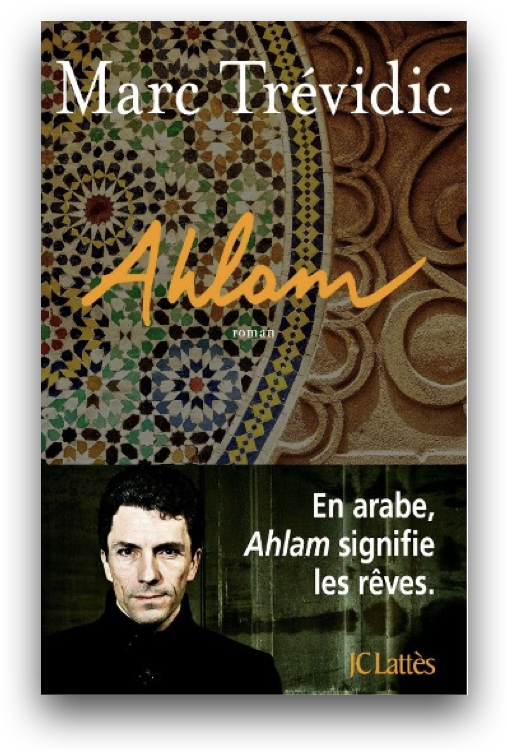
View On WordPress
#0/20#Art#BadList#Colonisation#Famille#Fétichisme#Liquidation de la liste d&039;envies qui date de 10 ans#Maghreb#Orientalisme#Racisme#Révolution
1 note
·
View note
Text
Le Premier ministre israélien Netanyahu annonce officiellement le lancement de la colonisation "autour de Gaza".
🗣 « Nous investirons une somme très importante de 19 milliards de shekels pour lancer les colonies autour de Gaza sur plusieurs générations » déclare-t’il.
#gaza genocide#gaza fights for freedom#gaza strip#gaza under attack#free gaza#gazaunderattack#gaza under genocide#gazaunderfire#genocide in gaza#save gaza#stand with gaza#gaza#israel crimes#israeli colonialism#israeli crimes#israeli occupation#israel occupation#israel is an apartheid state#israel is a terrorist state#israel is committing genocide#israel is evil#israel is a war criminal#israeli apartheid#israel apartheid#israeli terrorism#colonies#from the river to the sea palestine will be free#i stand with palestine#free palestine#palestine
29 notes
·
View notes